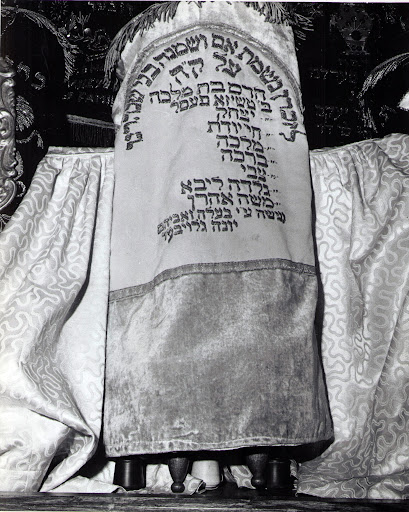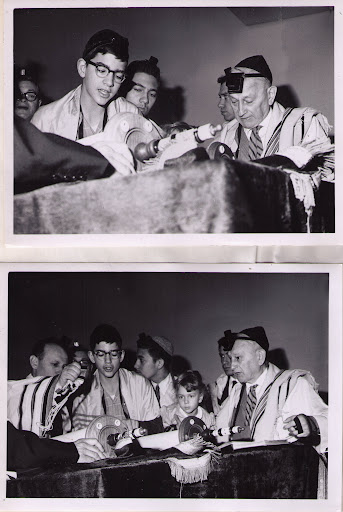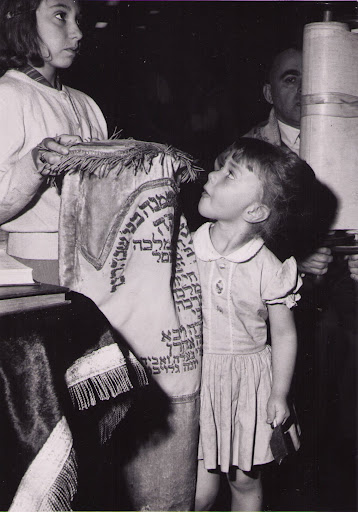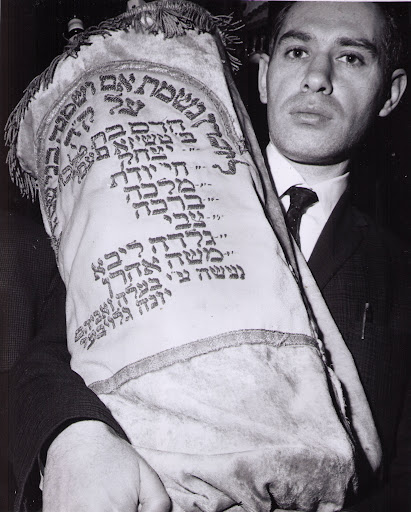Rabbi Jona Glauber
The story of Rabbi Jona Glauber of Brooklyn, New York, originally from Hungary, whose wife and 8 children were brutally murdered by the Nazis, mirrors the Biblical story of Hanna and her sons.
From the Memoirs:

1948. Rabbi J. Glauber is the head of the “Jeshieve” in Leiden, Holland and teaches about 15 boys. He originally came from Budapest, Hungary. When the Germans invaded this country in 1944, all Jews were deported. He and his family were sent to Auschwitz; his wife and 8 children (3 boys and 5 girls) from the age of 17 years down to 1 year were put to death. Rabbi J. Glauber stayed in Auschwitz for a week and was sent to other camps, at Mauthausen and Melk: (a.d.Donau )( Danube ), Austria. In this last camp an S.S. man chopped the thumb of his right hand off. He has had a “mantle” (Torah Scroll covering) made in the Hague, and the names of his wife and 8 children embroidered on this “mantle”. 1964. Rabbi J. Glauber now lives in Brooklyn, married again , 107 Division Avenue, Tele.: EV7-7673
There is a classic idiom that “History repeats itself”. But it seems that the repetitive events of history are not always exactly the same, but more cruel and shocking.
Jewish folklore relates the story of, a woman of valor and her seven brave children who lived in Palestine about 200 B.C.E. During that era, the great Greek king Antiochus Epiphanes conquered the land of Israel from the Jews, as he did with all the self ruling countries of the Near East, and decreed that all the inhabitants of his domain forsake their respective religions and accept instead the Pagan and Heathen religion which he himself practiced. He himself naturally enjoyed a special status under the statutes and customs of this religion, which afforded him so called “Divine” privileges.
It is related that one day his soldiers brought before him a stubborn family consisting of a mother, Hannah, and her seven children, who would not accept the new ordinances and would not bow down before the sculptured image of the Pagan gods and the king. Ruthless as he was, King Epiphanes nevertheless admired the beauty of this family and their apparent majestic physiognomy, and began discussing the matter with them on a business level. He began with the eldest, offering him a major military appointment if he would succumb to the wishes of the king. But the proud and loyal son could not pay the most dear price, his most precious possession – his religion – for any earthly status, convenience or prominence. The wrathful king ordered his servants to dismiss this son to be executed. The same story repeated itself five more times. The king vainly tried to persuade and cajole every one of the executed brothers, and explained to them that their refusal to accept his generous offer would mean death for them. But each one of these devoted sons declined the offer, and were all immediately executed. The king now remained with the youngest son, a most beautiful lad of eight, whom he thought he could surely persuade and Conquer.
There began a session of bargaining between the mighty king and the young boy, every offer being returned to the king, the boy only pitying the stubborn defiant king, fighting the cause of an untrue Pagan religion with blind dogmatism. Alas, the king made one last offer. “My dear son,” he exclaimed, “I am ready to forgo my previous demands for only one small act which I want you to do only one time, and thereby your life will be saved, and subsequently honored and rewarded. At the next public appearance which I will make in the central square of Jerusalem, I will ‘accidentally’ drop my golden ring to the floor not too far from the statue of the Pagan god. I will then only ask you to bend down and retrieve this precious ring – which you may keep, the multitude of the people will then be able to be told that you obeyed the decree of the king.” Even this “most generous” offer and plea of a great king was not acceptable to this boy. He explained to the king that he cannot deceive his people with the false pretense that he yielded to idol worship.
Just before the king’s servants seized the boy for execution, his Mother, who had been present throughout the entire ordeal, turned to her son and told him, “I am most proud of you, my son. When you come to Heaven, please beseech our Father Abraham and tell him: You have been commanded to offer only one son, but I have offered all my seven sons in honor of the G-d.” Hannah herself shortly thereafter met with her fate.
This moving story of such great courage, valiance, adherence and devotion which took place over 2,000 years ago, may seem to us part of bygone age, an age of heathen superiority ruled by the law of the jungle. Should anyone be approached for his opinion, whether its repetition was possible in the 20th century, no doubt his opinion would be negative. There lives amongst us a man, who can say: this historic story was repeated again to my family. The name of this man is Rabbi Jona Glauber, presently a resident in Brooklyn, New York.
The year is 1944. The triumphant armies of the Third Reich invaded Holland on May 10, 1940, and many other countries. Now it was Hungary’s turn. Rabbi Glauber, his wife and eight children (3 boys and 5 girls, aged 1 to 17) are captured and deported to the death factory of Auschwitz. Business is very good at the factory. There isn’t even enough time to classify and brand an identification number on the arms of the captives. At the young age of 38, Mrs. Glauber and all her 8 children are sent to the gas chamber, to pay supreme price for a heathen and jungle doctrine based on the superiority of one race over the other, which one of the most advanced
and cultured Christian civilizations were made to accept by a ruthless “leader”.
The miracle by which Rabbi Glauber was himself saved by the “Rivir” (sort of camp hospital) at Melk and Mauthausen, is not as great as the fact of his occupation immediately after the termination of The War.
His heart, his conscience and his soul could not find rest nor consolation. He collects about 15 young boys in Leiden, Holland, and establishes a Yeshiva (Jewish parochial school) wherein he teaches them. Should Rabbi Glauber have been given the opportunity to speak to his wife before her execution, he surely would have told her: “My dear Hadas: Go before our martyr Mother Hannah and tell her: you have offered your seven children for the sanctification of the name of the Almighty, and I have offered my wife and eight children for the same cause, under the heavy yoke and axe of bestial and most ruthless oppressor. Your children did have an alternative choice – mine didn’t.
In addition to his deep concealed impressions and shattering inner moral wounds, Rabbi Glauber also has an outward tangible reminder of his tragedy. While at the camp of Melk, an SS man sadistically chopped off his right thumb with a dirty heavy piece of steel. This SS man surely could not have known how deep a wound he thus inflicted upon Rabbi Glauber. For every time Rabbi Glauber lifts his hands and sees his NINE fingers, he is reminded of his 9 dearest which he lost so unnecessarily. He can never forget; his personal bitter experiences at the camp of MELEK are a constant reminder of the commandment of the seventeenth verse in the twenty fifth chapter of the book of Deuteronomy. It is stated there : “Remember what Amalek did unto thee.” AMALEK and MELEK are synonymous to him, much more than mere coincidence.
In choosing a living memorial for his lost family, Rabbi Glauber had a “Mantle” (ornamental coat covering the Holy scroll of the five books of Moses) made in The Hague, with the following inscription:
“IN MEMORY OF A MOTHER AND HER EIGHT CHILDREN WHO WERE
MARTYRED UPON THE SANCTIFICATION OF THE NAME OF THE ALMIGHTY
HADAS THE DAUGHTER OF MALKA
HER CHILDREN
— BETSY’SA PESEL
— ISAAC
— CHAYE JUDITH
— MALKA
— BRACHA
— ZVI
— GOLDE LIBBY
— MOSES AARON
DEDICATED BY THEIR HUSBAND AND FATHER
JONA GLAUBER”


Excerpt from Frankenhuis Collection, Memoirs Volume 23 – Rabbi Jona Glauber
